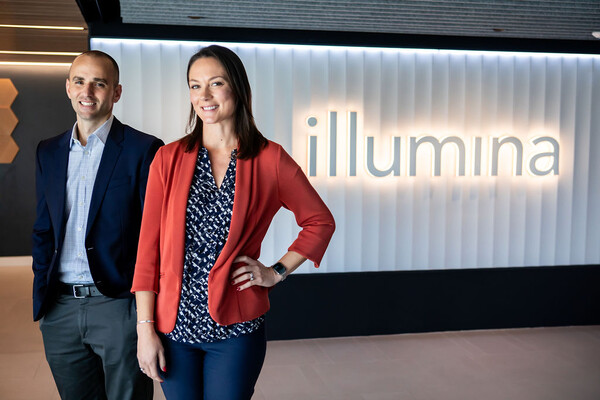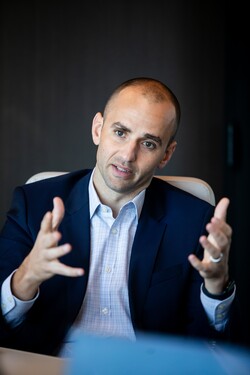Illumina, a pioneer in genomics, recently celebrated its 25th anniversary.
Founded in 1998, Illumina has emerged as a pivotal force in global research for genomic research, delivering pioneering advancements that have reshaped the industry.
The company's technologies have been cited in an impressive array of over 300,000 academic papers.
Illumina's trailblazing efforts have been particularly transformative in human genome sequencing.

Korea Biomedical Review interviewed Ashley Van Zeeland, Vice President of Corporate Development, and Brandon Selby, Associate Director of Product Management in Oncology, who shared insights into the company's journey and impact on genomics and healthcare.
Van Zeeland began by reflecting on Illumina's inception, emphasizing the company's foundational work in microarray technology, instrumental in the International HapMap project, which mapped common patterns of DNA sequence variation in the human genome and was a significant step towards understanding human genetic diversity.
"Celebrating the 25th anniversary was a moment to reflect on how far the whole field has come and Illumina's role in shaping the transformation of genomics," she said.

She recalled the monumental efforts in sequencing the first human genome — a 10-year endeavor costing $3 billion.
"In contrast, Illumina's NovaSeq X, launched in 2022, can sequence 20,000 whole genomes in less than a year for just $200 per genome," Van Zeeland said. "This is an incredible transformation in this space, and Illumina's story until now has been about driving the innovation to unlock each next level of capability and scale in genome sequencing."
Van Zeeland stressed that the NovaSeq X exemplifies the dramatic advancements in sequencing technology.
"The NovaSeq X is our highest throughput platform to date and has twice the throughput of our last flagship sequencer, Novaseq 6000," she said, pointing out its environmental benefits and stressing that the device is the most sustainable sequencer that Illumina has ever developed.
"We expect that the high output and sustainability will have a profound impact on precision medicine, as it will help expand diversity and broader access to this technology," she said. "We all realize that because of the cost structure and certain barriers, a lot of the large genomic datasets were not particularly diverse."
However, by breaking the cold chain by having more ambient chips, lower cost structures, and a more robust instrument, Illumina expects that researchers will be able to now create population sequencing efforts in those areas and populations that are underrepresented in the large cohorts, she added.
Van Zeeland stressed that this will be important. That’s because when countries have the genome map as a foundation, they can potentially identify and better target screenings and monitoring and intervene earlier, lowering the cost of healthcare.
"Ultimately, countries will be bending that total cost curve because they are not waiting for a disease to get too far out of hand," she said.
Use of AI and data management
Throughout the interview, Van Zeeland discussed integrating AI and data management into Illumina's genomic technologies, focusing on creating meaningful insights from data and efficiently handling large volumes.
"A big focus for us has been how to generate data at a quality and a lower cost structure with amazing precision," she said. "However, the field has changed as Illumina sees a paradigm shift to not just produce data but to create meaningful insights from it."
Van Zeeland stressed that this is where AI comes in, a cornerstone in the company's product development spanning multiple levels, from handling biological samples to interpreting complex data.
Addressing the challenges of data management in healthcare, particularly with the influx from decentralized care and telemedicine, Van Zeeland acknowledged the need for efficient data handling.
"Previously, our customers wanted the best platform for generating high-confidence data," she said. "However, it's now about managing the volume and velocity of that data and combining it with clinical information.
This led to Illumina's acquiring Edico Genomics, which owned the Dragen technology, which she described as "the fastest and most accurate way to get to secondary variant calls."
The integration of lossless compression technology and the development of the Illumina Connected Analytics cloud platform were also highlighted as significant strides in managing the data deluge.
Discussing the company's approach to open innovation, particularly in the wake of the Covid-19 pandemic, Van Zeeland pointed out Illumina's long-standing commitment to being an "ecosystem participant."
"We've always known that we can't achieve our mission alone," she said. "Illumina's goal is to unlock the power of the human genome to improve health, a mission that requires collaboration across various sectors."
She expressed excitement about new developments in proteomics, facilitated by external innovations now being integrated into Illumina's platform, enhancing scalability and accessibility.
Illumina's role in genomic sequencing to address unmet needs in oncology

Meanwhile, Selby stressed NovaSeq X's role in comprehensive genomic profiling in oncology, highlighting its efficiency in large-scale patient testing and its impact on reducing sequencing costs.
"With NovaSeq X and the amount of data it can generate, researchers can get more patients tested in a single batch," Selby stated. "The CGP in oncology is an evolving landscape with a shift towards whole-genome sequencing and multi-omics, a transition catalyzed by the NovaSeq X's capabilities."
Notably, Selby stressed that Novaseq X also brings down the cost of sequencing.
"If we look at certain applications, like liquid biopsy, it requires a lot of sequencing, and the cost can be a significant barrier, especially if we consider available reimbursement," he said. "Being able to move that type of testing to Novaseq X, prices get down to a more attractive prospect of receiving reimbursement, which, in turn, makes testing more broadly available to more patients."
The conversation also delved into the transformative role of liquid biopsies in cancer diagnostics.
"Unlike traditional tissue biopsies, which require surgical intervention, liquid biopsies involve a simple blood draw, making them less invasive and more accessible," Selby said. "With a liquid biopsy, rather than a surgical tissue biopsy, you simply take a blood draw."
Selby stressed that this has opened up new opportunities.
"For example, especially patients with advanced stage or metastatic cancer that might just not be healthy enough actually to undergo a tissue biopsy can now receive the liquid biopsy," he said. "There's also a lot of excitement and other applications like screening for early detection and monitoring."
Despite these advancements, Selby explained that challenges remain in the widespread adoption of liquid biopsies, including reimbursement and evidence generation.
"I do see a lot of opportunity in the clinical evidence generation. Liquid biopsy is a lot newer relative to tissue testing, and there's always a strong need to develop a robust set of clinical evidence to prove the clinical and economic benefit of doing a new type of testing," he said. "However, there's going to be a lot of potential with next-generation sequencing for these applications, and they're going to have a very large positive impact on cancer patients."
Selby reassured that Illumina addresses these challenges through continuous innovation and robust clinical evidence generation.
"We're focused on generating that clinical evidence because we know, ultimately, to change clinical practice, we have to have the evidence and the data to support making those changes," he said.
Selby discussed the revolutionary impact of next-generation sequencing (NGS) in developing companion diagnostics for cancer therapy. He described how NGS shifted the paradigm from multiple single-gene tests to a consolidated approach, enabling efficient selection of therapy.
"With NGS, we can look at all relevant genomic biomarkers in a single test," he said, highlighting the efficiency and potential of this approach in identifying new biomarkers for future therapies.
Addressing the barriers to implementing companion diagnostics, Selby emphasized the need for IVD tests, cost efficiency, and user-friendly solutions. He highlighted Illumina's commitment to developing these solutions, ensuring high-quality tests that can be broadly adopted.
Illumina's works in Korea
Commenting on Illumina's strategic approach to the Asian genomics sector, Van Zeeland shared her insights into collaborations aimed at collecting diverse genomic data, such as the project with Invites Genomics to collect data from 50,000 Koreans.
She reemphasized the importance of representing diverse populations in genetic data to advance discovery and precision medicine.
"We simply haven't looked broadly enough to say that we've tapped out on the discovery possibility from the genome," she said.
Looking forward, Van Zeeland shared Illumina's vision for the future, focusing on collaborations and leveraging genomics to improve individual and population health. She expressed optimism about the potential of AI and cloud computing to accelerate discovery and applications in healthcare.
"With the combination of AI, massive cloud computing capability, and how much data that can generate, I think the pace of discovery will start taking off exponentially for the next 25 years," she said.

